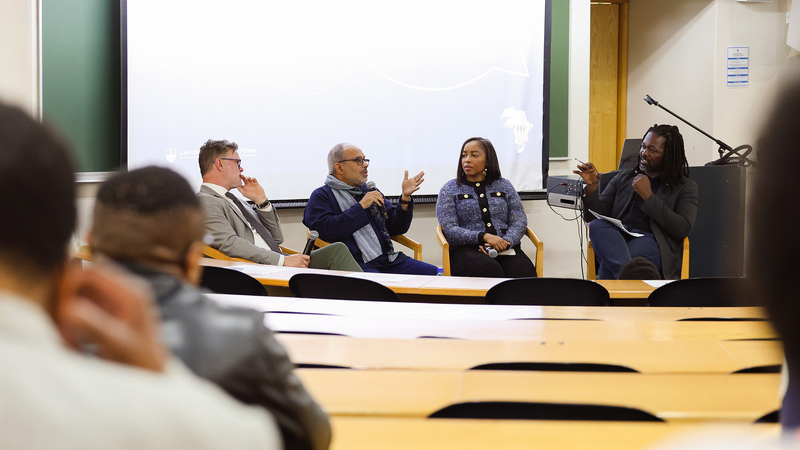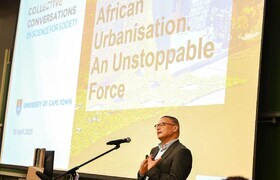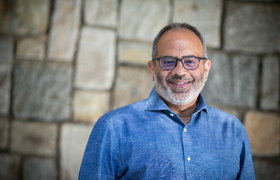Reimagining Africa's future in times of turbulence and disruption
03 October 2025 | Story Sarah Marriott. Photo Je’nine May. Video Production Ruairi Abrahams, Boikhutso Ntsoko and Nomfundo Xolo. Read time 8 min.Demographic changes, climate disruption and technological acceleration are driving profound global structural shifts. The world is undergoing rapid transformation driven by these three intersecting megatrends that present unique challenges and opportunities, especially for Africa. This context poses critical considerations for universities having to rethink their role amid shrinking research funding, contested knowledge production and digital disruption.
A panel of experts discussed these issues at the third event in the Collective Conversations: On Science for Society series held on 18 September 2025, themed “Remaking global rules: African agency in a fragmented world order”. Hosted by the University of Cape Town (UCT) and convened by the Vice-Chancellor, Professor Mosa Moshabela, the series aims to bring together voices from across disciplines and sectors to engage with pressing societal challenges.
Professor Jeff Murugan, UCT’s acting deputy vice-chancellor for Research and Internationalisation, provided the welcome and noted that these kinds of gatherings are central to UCT’s commitment to advancing research. “In a word, these conversations are – nourishing,” he said, explaining the significance of these sessions to him as an academic.
Influence beyond lecture halls
Professor Murugan remarked that the rules by which nations, institutions and communities interact with each other are changing, presenting an opportunity for the continent to leapfrog traditional developmental trajectories as a co-creator of the next wave of intellectual and economic value. “We’re at this crossroads where Africa could be the next giant that awakes,” he said.
“We have a commitment to consider how we collectively can ensure Africa’s agency is both visible and consequential in remaking the global rules. This is where universities have a critical role to play as scholars, educators and convenors. Not just as places of learning, but as platforms for convening diverse voices for generating new ideas and influencing the world beyond our lecture halls.”
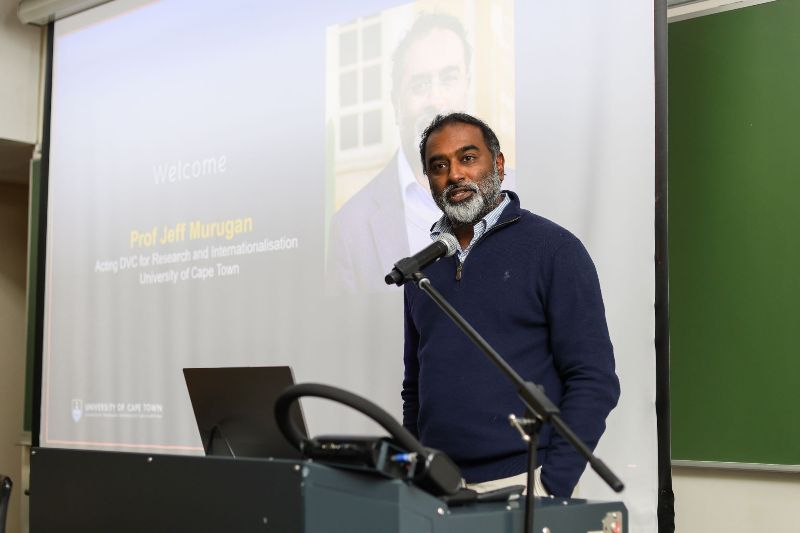
Murugan stated the need to produce globally relevant knowledge that is locally grounded, and to prepare the next generation to navigate and influence an increasingly complex world. “We have a responsibility to ensure that African perspectives are not only heard but that they're acted upon in global conversations. That's really what higher education is being called to right now. That's our imperative.”
Navigating turbulence and systemic collapse
Professor Carlos Lopes, an honorary professor at the Nelson Mandela School of Public Governance at UCT, offered the provocation that “disruption has become a job description”. He cautioned that the new normal required preparing for turbulence rather than stability. While prompting questions around how policies might create qualitative positives for society, not just growth.
Professor Lopes described the shift in demographics as “the mother of all mega trends” with vast consequences and impact. “Yet demographic stress in the discussion is completely ignored.”
In societies where people are increasingly living longer but not participating in the workforce, the body of structures created by the state to cater for older populations collapses. This conflict is paired with low fertility in societies subscribed to sustainable development, implying a protecting of the future for following generations.
“But what if you don't have children? Or what if the children are in another geography, not yours?” Lopes asked. “Then you become selfish, conservative and focused on catering for your small corner of the world – less global.”
Disruption has become a job description.
He also discussed technology disruption in terms of tech-intensive processes and products. “Consider innovation ecosystems: you will think they are not in Africa. But the problem is that innovations can become just gadgets. They only become useful when they become consumer products,” he said. “We need to get used to the concept of productivity as the driver of our economic thinking.”
Yet the consumption of tech intensity is difficult for aging populations to absorb. “Younger populations have an advantage that is obvious – and we tend to forget that the majority of the digital natives we like to talk about, are African.”
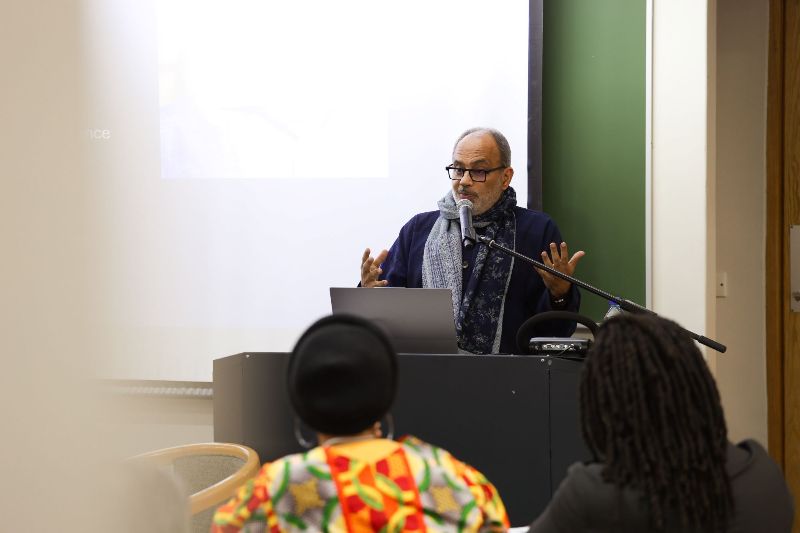
Lopes also warned that the continent needed to prepare for the implosion of the intellectual property regimes following the huge disruption caused by artificial intelligence and the new generative language, boosted by quantum computing disrupting encryption models.
“Multilateralism is not just under attack, it's being dismantled. And we better be ready for it,” he said, mentioning the unique opportunity this situation offers Africa. “It's absolutely fundamental for us to realise that we have to be capable of identifying the granular interventions that are going to make a difference.”
Getting past the platitudes: securing Africa’s developmental bargain
Professor Richard Calland, director of the University of Cambridge Institute for Sustainability Leadership and an Emeritus Associate Professor in Public Law at UCT, offered some ideas about how Africa might prepare and position itself in the face of this set of systemic and structural threats and transformations.
These included geoeconomics and shifts in economic and trading relationships; strong transnational regulations in finance and foreign direct investment; and reconstructing the approach to development through developmental bargains made between elite power holders and the rest of society.
Professor Calland shared seven recommendations for consideration. From a complete reset in relations with global geo-economical partners based not on development and aid but on common strategic interests, to securing a new arrangement based not on a flow of charity or philanthropy, but rather on trying to tackle common strategic interests.
“Shifting the risk calculus, possibly through building an African ratings agency, could address the excessive and often unreasonable cost of capital,” he suggested. Calland also said “it’s about getting tougher about our own assets – no more minerals concessions – and securing the best possible deals.”
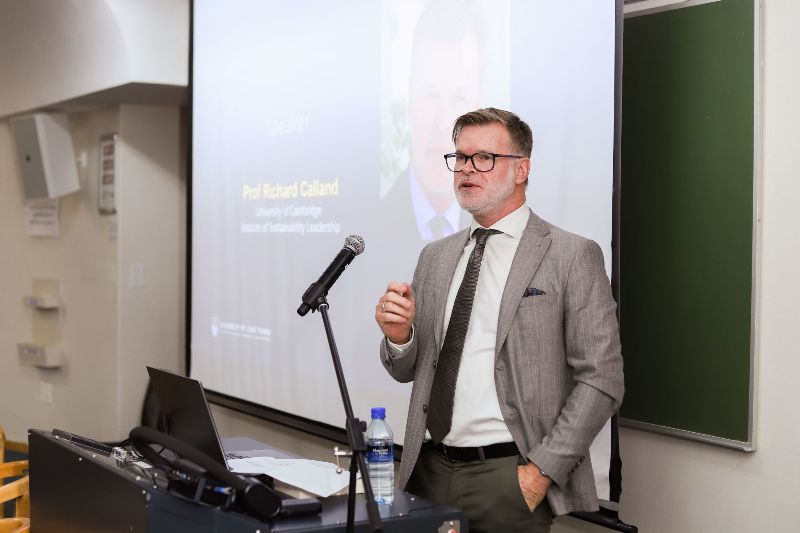
He noted that getting the governance right would maximise domestic resource mobilisation in terms of recognising and confronting the debt crisis that constrains fiscal space in many African countries. He insisted that overcoming the political economy barriers to transition as well as turning threat into opportunity and progress required “courageous, farsighted and truly strategic leadership”.
The need for tripartite collaboration
Phuthi Mahanyele-Dabengwa, South Africa CEO and an Executive Director of Naspers, underscored the dual reality the major African technology player faces. Globally, Naspers is an "AI first organisation" recruiting thousands of machines to ensure 100% accuracy in terms of data they have access to.
“It might appear as if we're trying to replace people in terms of employment,” Mahanyele-Dabengwa acknowledged, “but that is not the case. We are trying to ensure that with these robot ‘colleagues’ doing all the menial work, our human colleagues can have the ability to spend their time on the sophisticated thinking required.”
In stark contrast, Naspers operations in South Africa involve distribution centres filled with thousands of people. In part, this is because the country lacks the necessary skilled workforce to implement high-tech automation. South Africa has a disproportionately low number of STEM graduates compared to other global South economies.
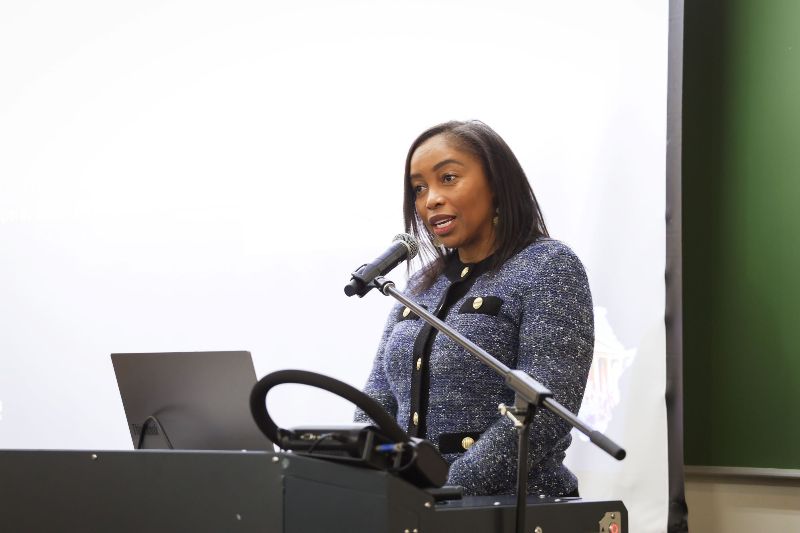
Despite being home to the majority of "digital natives," the continent is failing to prepare its youth. “We need to look at the basics, such as access to connectivity,” she said. The assumption is that children have basic digital literacy and access to electricity, and therefore have access to the ability to engage online so that they can become active participants in the industry. “But the reality is that we live in an environment right here in this very province where people don't have access.”
She warned that Africa risks being positioned merely as a consumer of external technologies rather than a co-creator of future intellectual and economic value. A young population is only a resource if it is educated, equipped with connectivity, digital literacy and quality STEM skills.
Mahanyele-Dabengwa observed that relationships often exist between government and universities, or the private sector and universities, but “the essential tripartite relationship is lacking”. Collaboration is needed to define a regulatory environment that fosters growth and allows businesses – both large and small entrepreneurs – to thrive.
A unique opportunity for Africa
Premised on the three speakers’ presentations, the panel discussion further explored the premise that the continent sits at the heart of complex dynamics. That Africa is not a passive bystander, but a region whose agency will help shape the global response – if it can assert its narrative and regulatory innovations, establish more deliberate cross-sector collaboration and capacitate its youth to be a knowledgeable and active contributor to these critical developments.
 This work is licensed under a Creative Commons Attribution-NoDerivatives 4.0 International License.
This work is licensed under a Creative Commons Attribution-NoDerivatives 4.0 International License.
Please view the republishing articles page for more information.


